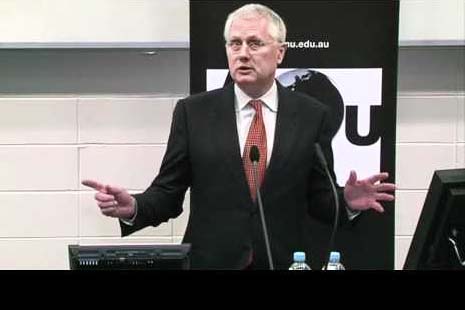WHEN Tony Abbott outlined the content of the government’s first “repeal day” – “the biggest bonfire of regulations in our country’s history” – the list contained plenty of anachronisms long overdue for abolition. Films will no longer have to be reclassified for every format in which they are issued, businesses will only need to apply once for approval to use agricultural and veterinary chemicals, and job agencies will no longer have to keep paper records for every applicant. But among these obvious targets, the prime minister also introduced legislation to abolish the office of the Independent National Security Legislation Monitor, established by the Labor government in 2010.
In the three years since Bret Walker SC was appointed Monitor, he has published three reports, with a fourth due to be submitted to the prime minister later this month. The first outlined an agenda and methodology for the office. The second and third examined – among other things – the definition of terrorism, the control order and preventative detention order regimes, the special powers of the Australian Security Intelligence Organisation to question and even detain non-suspects, the banning of terrorist organisations, the financing of terrorism-related activities, and the role of secret evidence in the courtroom.
Walker’s fourth report will complete the agenda he set out in his first report. He is examining aspects of the Crimes (Foreign Incursions and Recruitment) Act 1978 and the Australian Passports Act 2005 – intensely topical matters given the number of Australians who are believed to have travelled to Syria to fight the Assad regime. This report will also look at the preparatory terrorism offences, the potential for Australia’s military forces to be used in emergency situations and a variety of provisions relating to investigatory and pre-trial processes.
Together, the four reports survey all of the national security legislation explicitly identified in the Independent National Security Legislation Monitor Act 2010. The irony is that Walker’s comprehensive and thorough investigations also appear to have opened the office of Monitor to the prospect of abolition.
But Tony Abbott’s main rationale for abolishing the office – that “all relevant legislation has already been reviewed” – misses the key reason for its establishment. The Monitor was not created to review the anti-terrorism laws once and once only; it was established to provide continuing review. As well as reviewing “the operation, effectiveness and implications of the laws,” the act requires the Monitor to consider whether the legislation “remains proportionate to any threat of terrorism or threat to national security, or both” and whether it remains necessary. What is proportionate today may not be proportionate tomorrow, or next week, or next year, and the act recognised the importance of a periodic review of the laws in light of the threat of terrorism at a particular time.
Not only do changing threat levels necessitate this ongoing process. We must also learn from our experience of the practical effectiveness of these laws and their impact on civil liberties. For this reason, in his third report, Walker noted that his consideration of the use of the National Security Information (Criminal and Civil Proceedings) Act 2004 in anti-terrorism cases was “provisional, in the nature of a progress report only.”
Another argument that the government has made for repealing the office of the Monitor is that a process of continuing review is not the most effective form of scrutiny in the field of anti-terrorism. The explanatory memorandum to the Independent National Security Legislation Monitor Repeal Bill 2014 states that the government “considers that placing the laws in a constant or continuous state of wholesale review has not proven to be the optimal form of oversight.” None of the reports prepared by Walker provide support for that view. His reports have been detailed and meticulous, and they have offered important recommendations for change – both to wind back the anti-terrorism laws and also to improve their operation and efficacy.
An office of continuing review has long been regarded as the best form of oversight in the anti-terrorism context. In 2006, the Security Legislation Review Committee (known as the Sheller Committee) proposed the establishment of an independent reviewer of anti-terrorism laws. The Parliamentary Joint Committee on Intelligence and Security agreed. In a report from the same year, it stated that “there is now a case for independent ongoing oversight of these laws." It proposed a model that:
…takes a holistic approach to terrorism laws with a statutory mandate to report annually to the Parliament. This suggests a single independent appointee, rather than periodic review by an independent committee. A single appointee would overcome the existing fragmentation by providing a consistent and identifiable focal point for the community and the executive agencies.
Calls for an office of independent review were repeated by the Hon John Clarke QC in a 2008 report examining the aborted terrorism prosecution of Dr Mohamed Haneef. He considered that a powerful office of independent review was essential to overcome some of the problems he faced in conducting his inquiry, particularly an absence of powers to compel information from government agencies.
Interestingly, it was the Coalition in opposition that first heeded these calls. In 2008, two separate private members bills were introduced by Liberal MPs. Petro Georgiou introduced a bill into the House of Representatives in March 2008 to “appoint an independent person to ensure ongoing and integrated review of the operation, effectiveness and implications of laws in Australia relating to terrorism.” That bill failed. A second, almost identical bill was then introduced – again unsuccessfully – by senators Judith Troeth and Gary Humphries in June. Once again, it sought to provide for “ongoing and integrated review” of the anti-terrorism laws.
A very different attitude is being expressed by the Coalition in government. The third reason given for the repeal of the office of Monitor is that pre-existing parliamentary and executive oversight mechanisms are sufficient to provide meaningful and effective review. The explanatory memorandum to the repeal bill argues that:
Australia has a comprehensive range of standing and ad hoc oversight and accountability measures already in place. These measures include existing independent oversight bodies such as Parliamentary Committees, and executive powers to appoint ad hoc review… Comprehensive oversight of relevant counter-terrorism and national security legislation will remain despite this repeal.
There is some truth to this. The repeal of the office of Monitor does not necessarily mean that the anti-terrorism laws will no longer be subject to review. The problem is that history also shows there are critical deficiencies in each of the alternative review processes. For example, parliamentary committees do not offer a comprehensive review of all of the anti-terrorism laws, only those aspects that fall within their remit. The use of multiple models of review with different terms of reference also creates a fragmented and sporadic review process. Because of this, multiple reviews have often made conflicting recommendations on a particular issue. This has allowed the government – when it has bothered to respond at all – to point to a lack of consensus and thus avoid implementing the proposed reforms.
The office of Monitor was established to overcome these difficulties. The Monitor is tasked to consider all of the national security and anti-terrorism laws. It is able to do so holistically and in an ongoing fashion, in the context of both the existing terrorist threat and other provisions available to the security and intelligence agencies to respond to the threat of terrorism. Furthermore, the Monitor is granted full access to intelligence material through the provision of unrivalled coercive information-gathering powers. The Monitor sees what the government sees. It can test the operation, effectiveness, implications, appropriateness and necessity of Australia’s anti-terrorism laws against all of the available evidence.
There is one area in which the Monitor has not managed to improve on the past reviews of the anti-terrorism laws, however. And this is reflected in the final reason given by the Coalition for the repeal of the office: the lack of political will to engage with the Monitor. Abbott has pointed out – accurately – that “the former government ignored all the Monitor’s recommendations.” But this is not a persuasive reason for repeal. It is entirely within the powers of this government to remedy that lack of response and begin to engage constructively with the Monitor’s recommendations.
A failure to respond to the recommendations of review bodies is by no means a new phenomenon in the anti-terrorism context. In fact, just as it has plagued the office of the Monitor over the last three years, it also undermines the effectiveness of the ad hoc and standing committees. The government has made statements to the effect that the best way forward is to work through the long list of recommendations made by Bret Walker SC. History tells us there is good reason for doubting that this will happen. The 2006 reports of the Sheller Committee and the Parliamentary Joint Committee on Intelligence and Security were not responded to by either the Coalition or Labor governments until 2009. And, even then, the attention they were given was cursory at best.
Ultimately, the real advantage of the office of Monitor lies in keeping the government of the day on its toes. Unlike other review bodies, it is able to ensure that anti-terrorism law reform does not fall off the agenda. The Monitor may also keep tabs on any progress that the government is making towards implementing recommendations. It is hard to avoid the conclusion that it is this – far more than any of the reasons given above – that has really motivated the move to abolish the office. •




